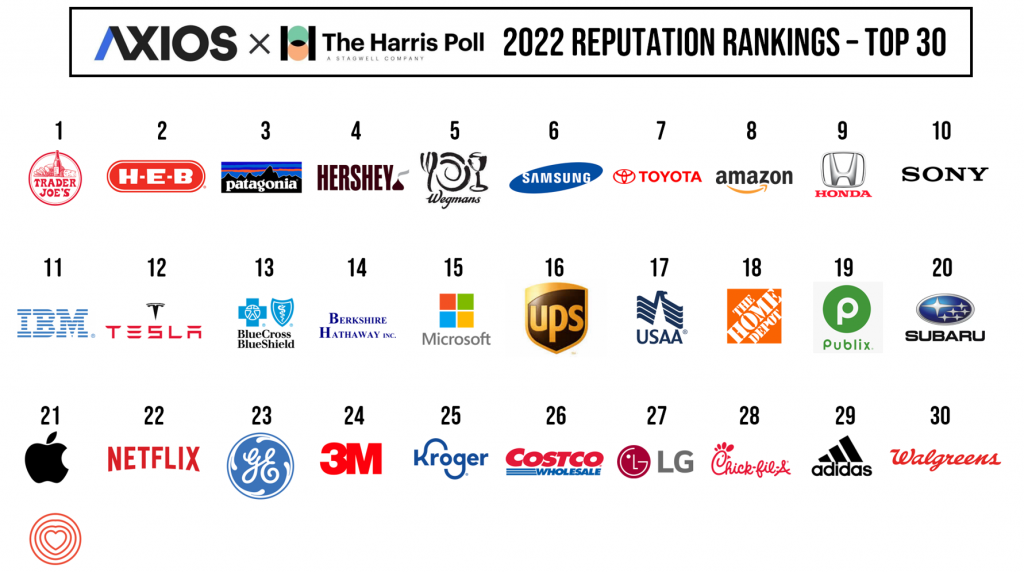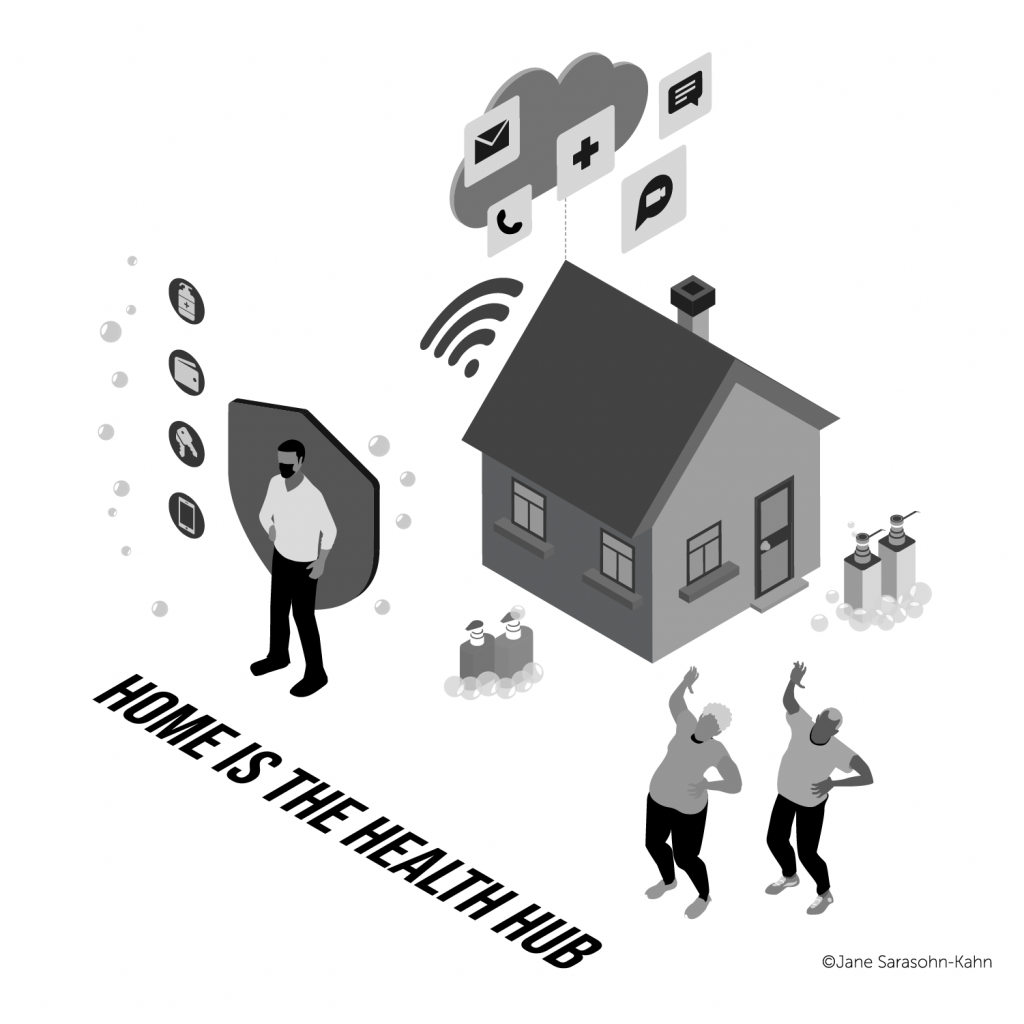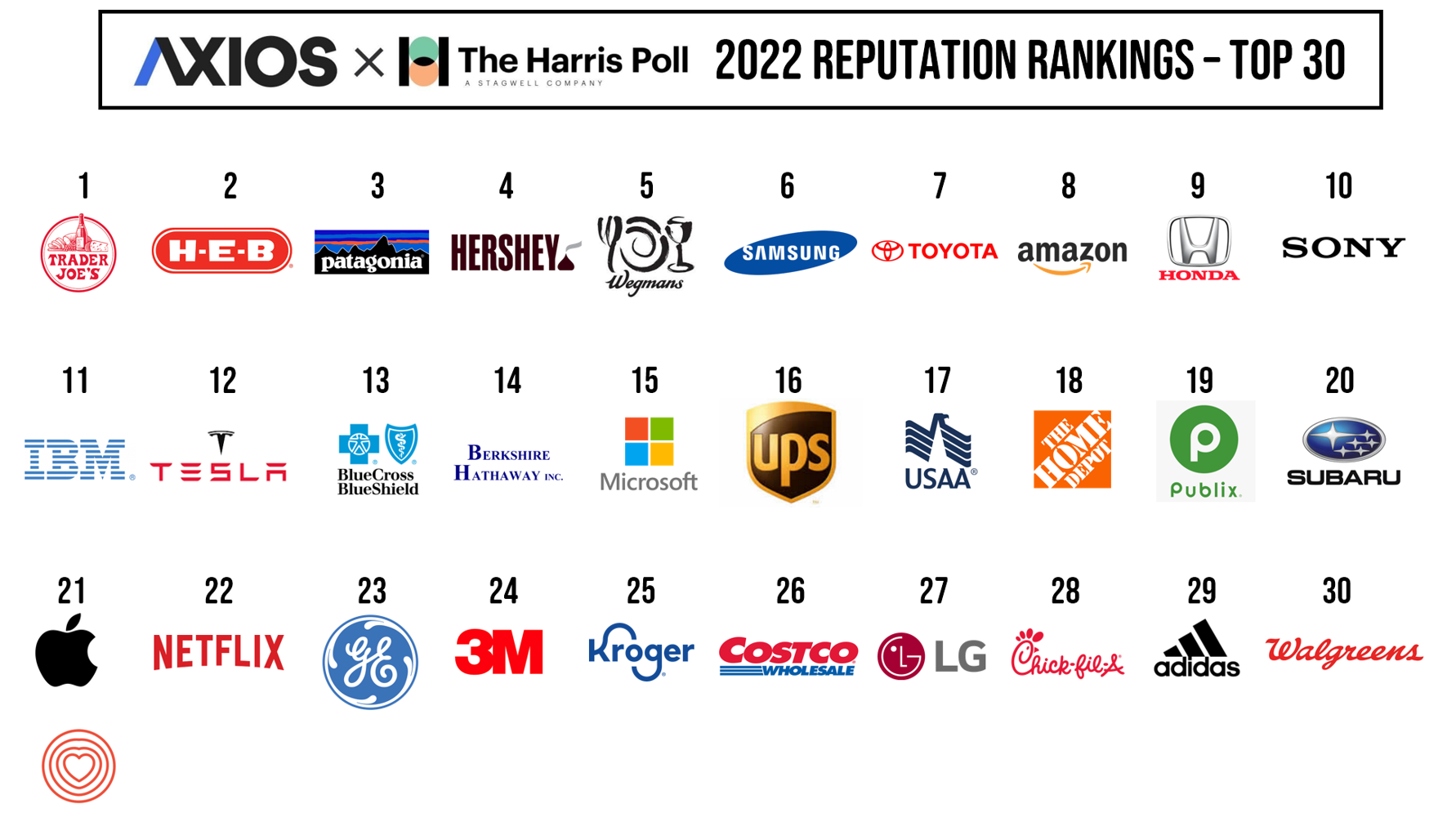We’re all about food and cars and our technology, looking at the 2022 Axios Harris Poll 2022 Reputation Rankings published this week.

I’ve curated the logos of the top 30 companies based on the Poll’s survey of 33,096 U.S. adults conducted in March and April 2022.
The survey assessed peoples’ awareness of companies that either “excel or falter in society,” according to the study methodology.
Here you see the top 30.
The COVID-19 pandemic bolstered consumers’ awareness and call-to-action for peoples’ basic needs: food, working-from-home (thus, tech as a determinant of health and wellbeing), ecommerce (to get the goods we wanted to receive without leaving home), and mobility in the safety and hygiene of our own cars.
These are reflected in the top 50 as follows:
- Grocery stores: Trader Joe’s, H-E-B, Wegmans, Publix, Kroger, Costco (for food) in the top 30 (and the first 3 in the top 10)
- Consumer technology: Samsung, Sony, IGM, Microsoft, Apple, LG, and Best Buy (at #50, expecting to have a tough 2022 according to this Wall Street Journal coverage)
- Automotive: Toyota, Honda, Tesla, Subaru
- Health: Blue Cross Blue Shield, Walgreens (and CVS Health ranking #36 and Pfizer, #44)
- Recreation and fitness: Patagonia, Adidas
Finally, financial services and ecommerce/delivery also rank well in the Top 30, with Amazon and UPS. The Hershey Co., which has ranked well in similar studies in the pandemic era, has been visibly popular and beloved for snacking and small treats in a tough time.
That’s the coverage of the positive companies which have “excelled” in consumers’ eyes in the past year.
That begs the question: what organizations ranked at the bottom of Americans’ reputation rankings?

Since you asked, here’s the list of the bottom 5; remember, I’m just the messenger here.

Health Populi’s Hot Points: Our homes are increasingly the site of our health care — self-care through the traditional over-the-counter medicines channel, but more primary care and urgent care being conducted through telehealth and virtual care “digital front doors” as the current lingo coins it.
Even Netflix, a Top 30 company in this study, joined into self-care during the pandemic era through an affiliation with Headspace, supporting streaming consumers’ mental health and wellbeing.
Clearly the big winner in reputation during the pandemic, beyond some of the health care brands, was the grocery sector.
Grocery stores were already morphing into health destinations with co-located pharmacies and dietitians on-staff. In the pandemic, these were safe, hygienic, even social places “to go” beyond the safety of our homes. I expect grocery stores to continue to work hard to further develop ecommerce and curbside pick-up, health and wellness selections in-store, and growing services in and beyond the pharmacy counter, consolidating their pandemic-era relationships with health consumers.
I also know I’ll see more health-and-wellness embedded in cars at #CES2023 in Las Vegas, based on conversations I’m having with auto industry innovators these days, along with the growing role of Big Tech (and small) in digital health — Amazon, Apple, Microsoft, et. al., all continuing to evolve their health/care services and platforms.
People expect all companies to engage in health, wellness, and safety. The pandemic era, and now the next era where our mental health requires a big dose of comfort and assurance, will underpin and bolster this expectation.





 I am so grateful to Tom Lawry for asking me to pen the foreword for his book, Health Care Nation,
I am so grateful to Tom Lawry for asking me to pen the foreword for his book, Health Care Nation,  I love sharing perspectives on what's shaping the future of health care, and appreciate the opportunity to be collaborating once again with Duke Corporate Education and a global client on 6th May. We'll be addressing some key pillars to consider in scenario planning such as growing consumerism in health care, technology (from AI to telehealth), climate change, and trust -- the key enabler for health engagement or dis-engagement and mis-information. I'm grateful to be affiliated with the corporate education provider
I love sharing perspectives on what's shaping the future of health care, and appreciate the opportunity to be collaborating once again with Duke Corporate Education and a global client on 6th May. We'll be addressing some key pillars to consider in scenario planning such as growing consumerism in health care, technology (from AI to telehealth), climate change, and trust -- the key enabler for health engagement or dis-engagement and mis-information. I'm grateful to be affiliated with the corporate education provider  Thank you FeedSpot for
Thank you FeedSpot for